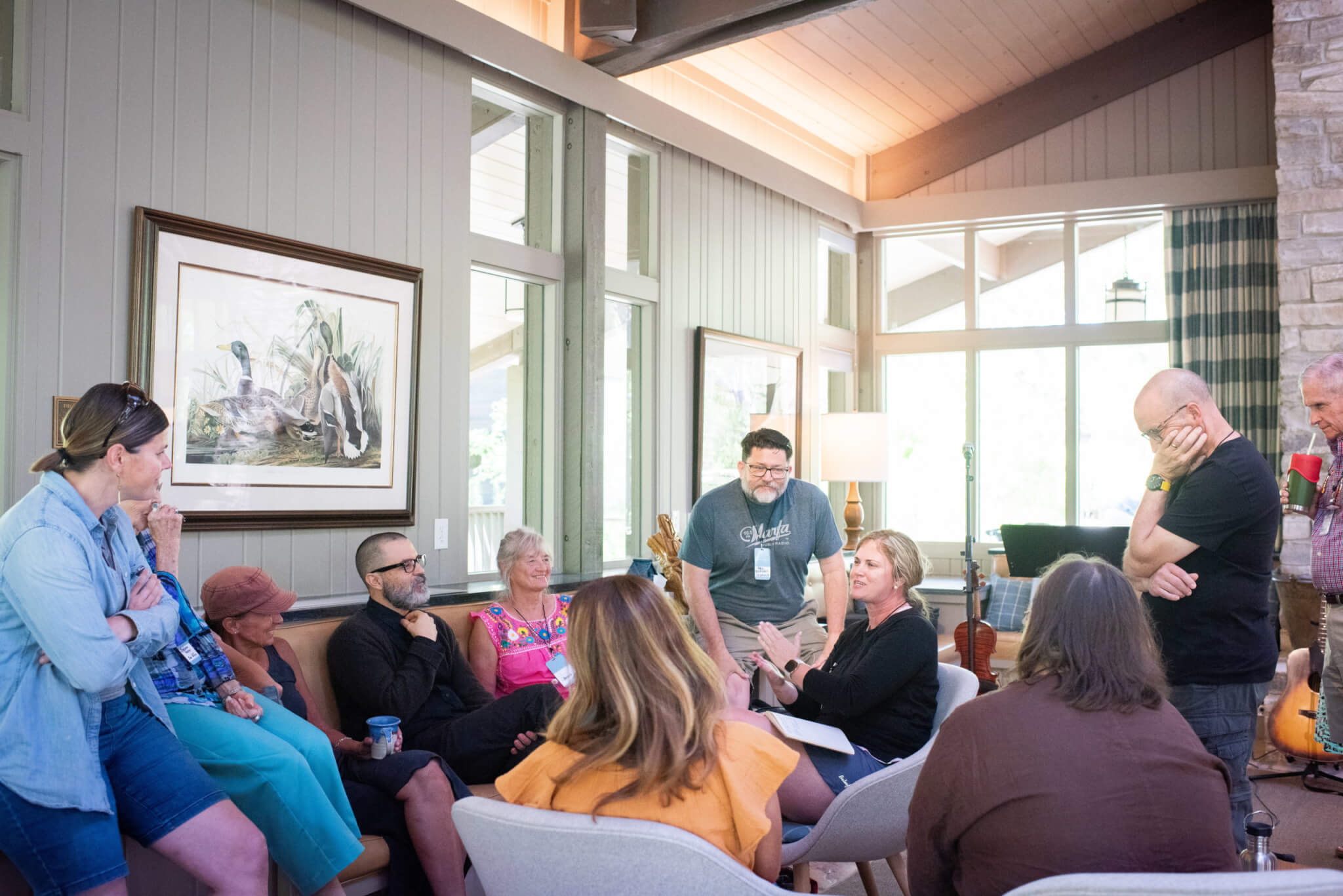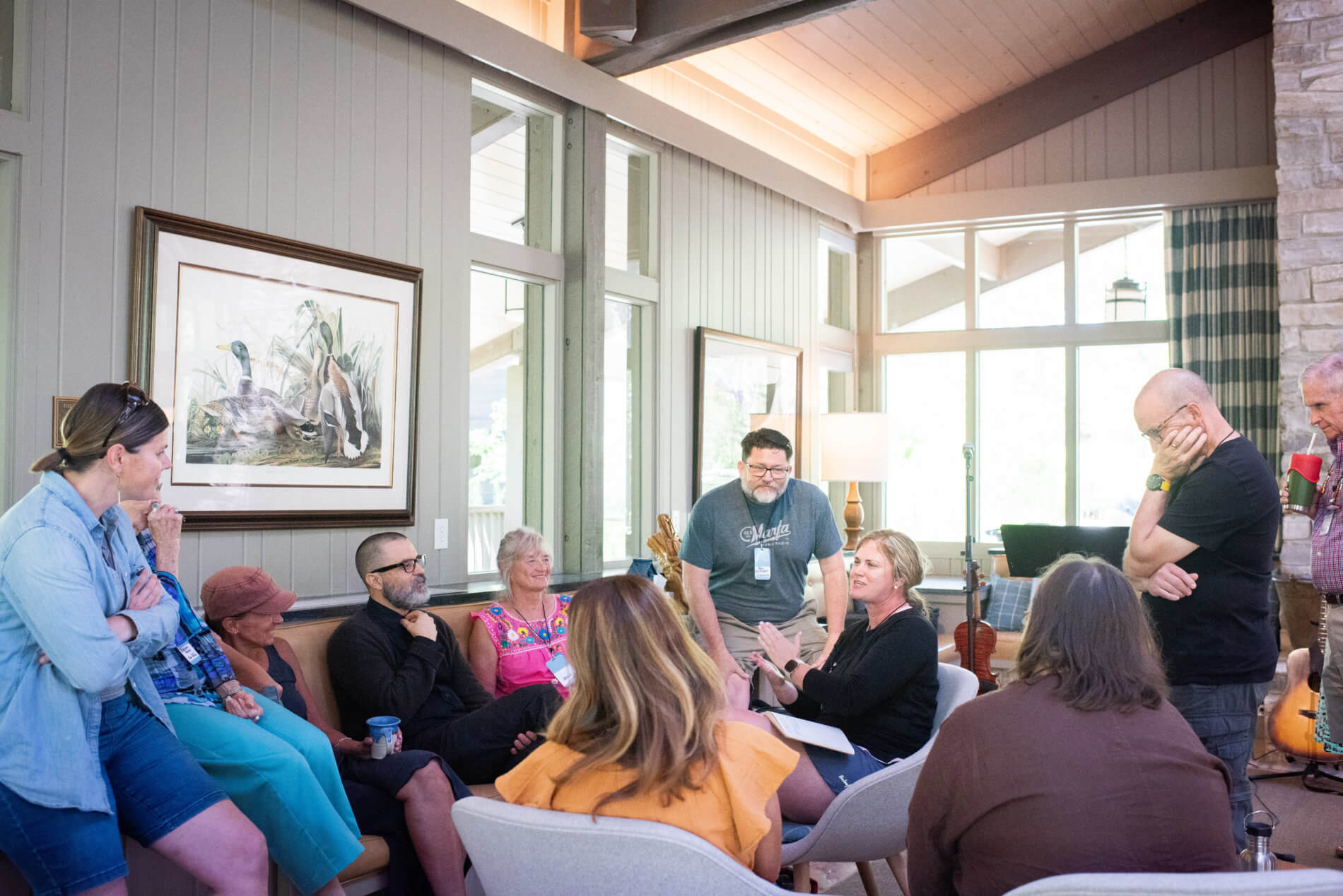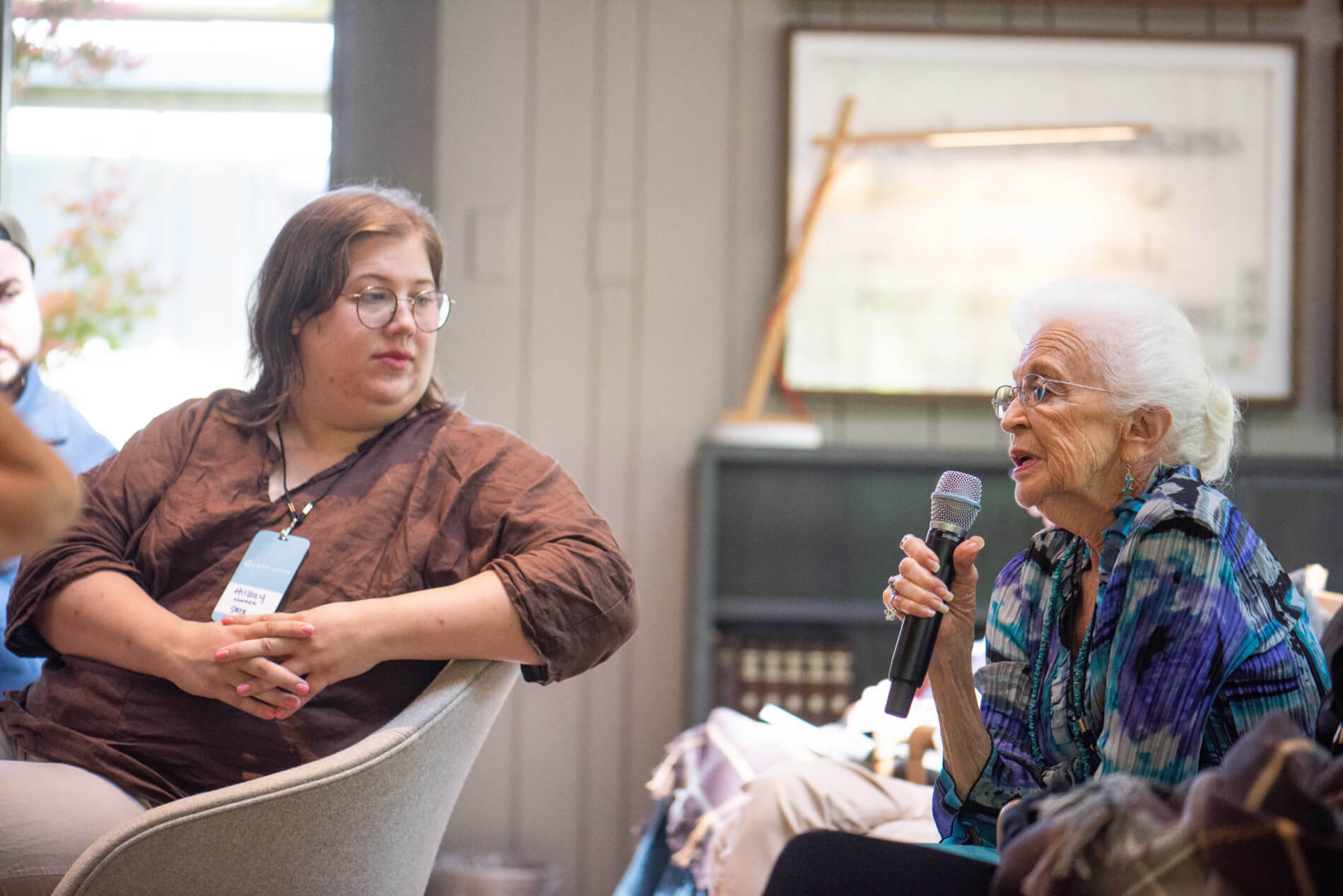


t was Thursday, June 9. Steven Purcell stood in front of the 40 or so adults gathered in the Great Hall at Laity Lodge as he worked his way through a tricky introduction.
Our age range—from 18 to 92—was as diverse as our faith backgrounds: Presbyterians, Baptists (including one self-proclaimed “walking Baptist hymnal”); nondenominational Evangelicals; folks who identify more with the term “ex-vangelical” than with a particular Christian tradition; Anglicans; Episcopalians; a Mennonite.
We’re also students, clergy, artists, psychiatrists, spiritual directors, architects, physical therapists, customer service representatives, filmmakers, writers, musicians, and missionaries. We gathered at this retreat for as many reasons as there were people. But while here, we were asked to reflect together on a challenging question:
“How does one go on being a Christian in America today?”
Purcell, standing in front of the Great Hall, read aloud a few headlines from the last six months of the magazine Christianity Today:

He also reminded us of the description of the retreat that was sent out to the Lodge’s email list a few months before: “as challenges multiply, as the church perfects the art of discrediting itself, as friends leave the faith, many Christians are feeling exhausted, disoriented, and discouraged. Some wonder how much longer they can stick with Christianity—or if they even want to.”
Purcell said the title of this retreat, “Faith in the Ruins,” inspired an unusual response. He shared a sampling of the mix of emails the staff received: “Wow, I’m so glad you guys are doing that.” “That’s where I’m living; I need to be there.” “I don’t get this at all. What are you talking about?” “I’m going to pass, thank you.”
As a colleague of the Lodge team—I’m the H. E. Butt Foundation’s graphic designer—I know how intentionally they prepare for each individual retreat. I can only imagine how much extra care went into this one.

We live in trying and polarizing times, and Christianity in America is caught up in that polarization. Can we come together across those divisions? Can our faith unite us even when we understand and practice that faith so differently?
On opening night, after Steven spoke, speaker and theologian Adam Neder described the rhythm that they had planned for our upcoming teaching sessions: he’d offer observations, we’d break into small groups to discuss, then we’d come back together to share and ask each other questions.
In his first talk, Neder, who is the Dale Bruner Chair of Theology at Whitworth University in Spokane, Washington, shared a list of ten observations for the retreatants to consider:
1. The American religious landscape is changing quickly.
2. American churches are becoming less politically diverse and more partisan.
3. Cable news and social media accelerate partisanship.
4. Politically moderate Christianity is disappearing.
5. The point of the Church is to receive and reflect the love of God in Christ.
6. The Church exists for the sake of the world.
7. Theological credibility is inseparable from credibility in other areas.
8. The Church’s credibility can only be harmed by the Church.
9. Being a savvy consumer makes it harder to find a Church.
10. The Church was never intended to rule.

Walking us through the list, Neder described recent data showing a significant decline in church membership, weekly attendance, and religious identification across the gamut of most American Christian traditions. Huge numbers of pastors are either quitting or seriously considering quitting, and would-be pastors are choosing not to go into full-time ministry.
The data sounds dismal, but in fact, our speaker was adamantly hopeful about the future of our shared faith: “It seems dark and heavy and bleak and discouraging and maybe even surprising. But we can also think of it as an opportunity for the Church to rediscover its calling to be salt and light … a community that does not desire to win and to dominate culture, but instead has a very different aim: to love and to serve and to suffer in the name of Jesus.”
The purpose of this Lodge retreat? To practice working together toward that very different aim.
These topics are tough for any group of people to discuss. But what about a group of relative strangers with wildly varying views?
Yet over the course of the weekend, with little-to-no hesitation, people committed to taking both our faith and the reality of our national environment seriously. We listened to one another, cried together, prayed together, and even disagreed together. Our small group discussions led to beautiful stories, giving honest witness to depression, isolation, and doubt, but likewise to healing, compassion, and unity.
A rhythm emerged: each night, many of us gathered in a circle with a half-dozen extra chairs pulled up for late evening conversations at Cedar Brake, the lodging area uphill from the Great Hall. We covered so much—divorce, being part of a pastor’s family, not being able to find a church. One man recalled Howard Butt Jr. recognizing a transformative spiritual experience at Laity Lodge by saying, “it’s very thin here”—as in, the veil separating the physical world from the spiritual world is less of a barrier.
It wasn’t all serious. We lounged and floated and swam at Blue Hole as we discussed our favorite movies and television shows. We marveled over the food as we dipped fresh vegetables in hummus and savored the small-batch cookies. We laughed at ourselves through our attempts at collaging in the art studios.
We found and reinforced a community—created not just by diving into hard things, but also in play and rest—and were therefore able to see each other more fully. She might be a liberal and he might be a conservative, but she’s also a great swimmer and he also loves Pixar! We sang praises together in the form of hymns, but we also shared in our stories of sitcoms and romcoms and the last thing that made us cry.
On Saturday morning, Neder called an audible. He recognized that the day before, he had covered so much ground in his talk that we didn’t have time for a larger group discussion. So we combined our two morning sessions into one longer one, giving us ample time for reflection.
Then, as the extra-long session came to a close and Steven Purcell dismissed us for a coffee break, most folks remained in the Great Hall, continuing their conversations in small pockets here and there throughout the room. Slowly, those smaller conversations migrated into one larger conversation, men and women posing and responding to questions together: “How do I show my friend who has left the Church that I love her?” “I am so heartbroken that the Church feels like it is collapsing.” “How can we make our places of ministry safe for the unheard and hurting people in our churches?” “Gathering like this, with believers of different backgrounds and affiliations, feels like a glimpse of heaven.”

Many different conversations between different people formed one large conversation. On Thursday afternoon, I doubt any of this would have been possible—at least, not to this degree. Outside the Canyon, we might have defined each other by our different viewpoints, passions, and commitments. Many of our paths wouldn’t have otherwise crossed in the first place. Fewer than two days later, we had stepped over those barriers. We weren’t talking past each other—we were in this together, and it was numinous.
“To love and to serve and to suffer” is not an easy calling to accept. In fact, it is impossible if we try to do it alone. But we are not alone. And during this retreat, I experienced solidarity with others who find themselves sometimes overwhelmed by the heartaches of the world we ultimately love—that can be steeped in cruelty and injustice, but is also beautiful and good.
On Saturday night, the retreat’s musicians, Valerie and Jon Guerra, sang over us in an honest prayer: “Coming to you ’cause I’m angry / Coming to you ’cause I’m guilty / Coming to you ’cause you’ve promised / To leave the flock for the one.” Then we closed the concert with a few hymns, our voices merging as one.

From "camp crush" to "I do," over 150 people have fallen in love at our Christian summer camp since 1967.